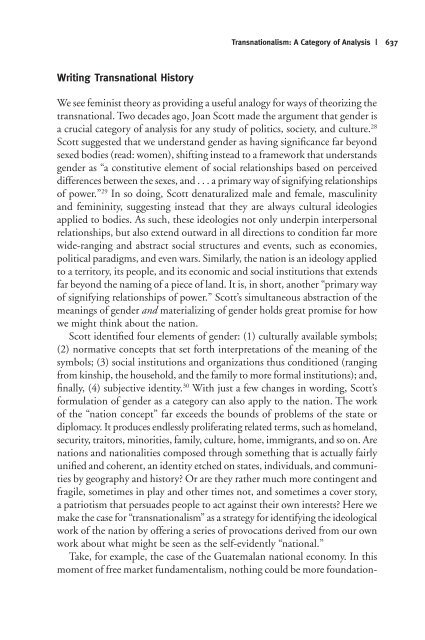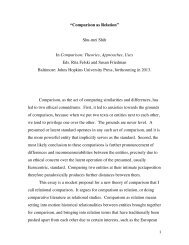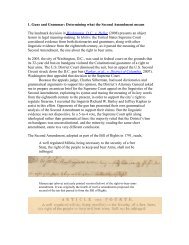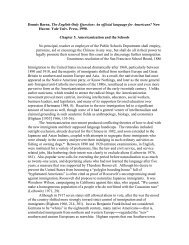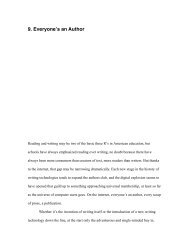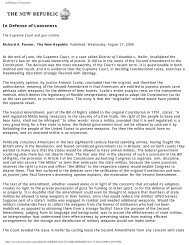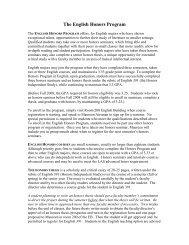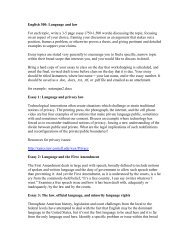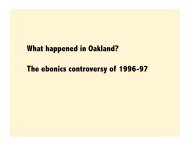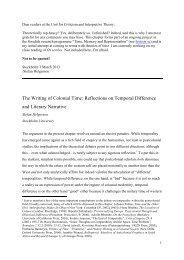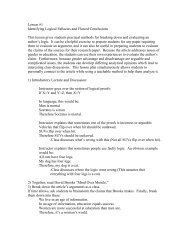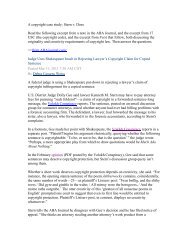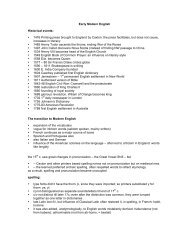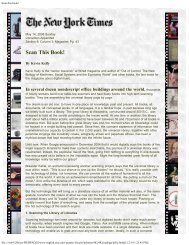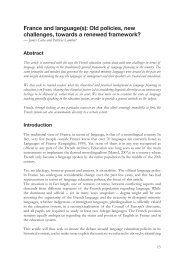Transnationalism: A Category of Analysis - Unit for Criticism and ...
Transnationalism: A Category of Analysis - Unit for Criticism and ...
Transnationalism: A Category of Analysis - Unit for Criticism and ...
Create successful ePaper yourself
Turn your PDF publications into a flip-book with our unique Google optimized e-Paper software.
<strong>Transnationalism</strong>: A <strong>Category</strong> <strong>of</strong> <strong>Analysis</strong> | 637<br />
Writing Transnational History<br />
We see feminist theory as providing a useful analogy <strong>for</strong> ways <strong>of</strong> theorizing the<br />
transnational. Two decades ago, Joan Scott made the argument that gender is<br />
a crucial category <strong>of</strong> analysis <strong>for</strong> any study <strong>of</strong> politics, society, <strong>and</strong> culture. 28<br />
Scott suggested that we underst<strong>and</strong> gender as having significance far beyond<br />
sexed bodies (read: women), shifting instead to a framework that underst<strong>and</strong>s<br />
gender as “a constitutive element <strong>of</strong> social relationships based on perceived<br />
differences between the sexes, <strong>and</strong> . . . a primary way <strong>of</strong> signifying relationships<br />
<strong>of</strong> power.” 29 In so doing, Scott denaturalized male <strong>and</strong> female, masculinity<br />
<strong>and</strong> femininity, suggesting instead that they are always cultural ideologies<br />
applied to bodies. As such, these ideologies not only underpin interpersonal<br />
relationships, but also extend outward in all directions to condition far more<br />
wide-ranging <strong>and</strong> abstract social structures <strong>and</strong> events, such as economies,<br />
political paradigms, <strong>and</strong> even wars. Similarly, the nation is an ideology applied<br />
to a territory, its people, <strong>and</strong> its economic <strong>and</strong> social institutions that extends<br />
far beyond the naming <strong>of</strong> a piece <strong>of</strong> l<strong>and</strong>. It is, in short, another “primary way<br />
<strong>of</strong> signifying relationships <strong>of</strong> power.” Scott’s simultaneous abstraction <strong>of</strong> the<br />
meanings <strong>of</strong> gender <strong>and</strong> materializing <strong>of</strong> gender holds great promise <strong>for</strong> how<br />
we might think about the nation.<br />
Scott identified four elements <strong>of</strong> gender: (1) culturally available symbols;<br />
(2) normative concepts that set <strong>for</strong>th interpretations <strong>of</strong> the meaning <strong>of</strong> the<br />
symbols; (3) social institutions <strong>and</strong> organizations thus conditioned (ranging<br />
from kinship, the household, <strong>and</strong> the family to more <strong>for</strong>mal institutions); <strong>and</strong>,<br />
finally, (4) subjective identity. 30 With just a few changes in wording, Scott’s<br />
<strong>for</strong>mulation <strong>of</strong> gender as a category can also apply to the nation. The work<br />
<strong>of</strong> the “nation concept” far exceeds the bounds <strong>of</strong> problems <strong>of</strong> the state or<br />
diplomacy. It produces endlessly proliferating related terms, such as homel<strong>and</strong>,<br />
security, traitors, minorities, family, culture, home, immigrants, <strong>and</strong> so on. Are<br />
nations <strong>and</strong> nationalities composed through something that is actually fairly<br />
unified <strong>and</strong> coherent, an identity etched on states, individuals, <strong>and</strong> communities<br />
by geography <strong>and</strong> history? Or are they rather much more contingent <strong>and</strong><br />
fragile, sometimes in play <strong>and</strong> other times not, <strong>and</strong> sometimes a cover story,<br />
a patriotism that persuades people to act against their own interests? Here we<br />
make the case <strong>for</strong> “transnationalism” as a strategy <strong>for</strong> identifying the ideological<br />
work <strong>of</strong> the nation by <strong>of</strong>fering a series <strong>of</strong> provocations derived from our own<br />
work about what might be seen as the self-evidently “national.”<br />
Take, <strong>for</strong> example, the case <strong>of</strong> the Guatemalan national economy. In this<br />
moment <strong>of</strong> free market fundamentalism, nothing could be more foundation-


